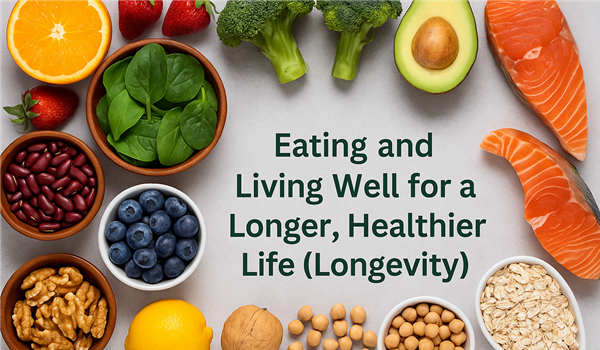Longevity Nutrition Lifestyle Advice

Patient Information Leaflet: Eating and Living Well for a Longer, Healthier Life
Kensington Medical Centre – Belfast
⸻
Living Longer, Living Better
A long life is most meaningful when it’s also a healthy one. The choices you make every day — including what you eat and how you live — can greatly influence your quality of life and how long you live.
⸻
Key Lifestyle Habits for Longevity
• Eat a balanced, nutritious diet
• Stay physically active
• Get enough sleep (7–8 hours nightly)
• Maintain a healthy weight
• Stay socially connected
• Avoid smoking and limit alcohol
• Manage stress through relaxation, hobbies, and support
⸻
Longevity-Boosting Foods
1. Colourful Fruits and Vegetables
Rich in antioxidants, fibre, vitamins, and minerals that protect against disease.
Examples: berries, leafy greens, broccoli, carrots, tomatoes
2. Wholegrains
Support heart and digestive health.
Examples: oats, brown rice, quinoa, wholemeal bread
3. Legumes and Beans
Excellent sources of protein and fibre, linked to longer life spans.
Examples: lentils, chickpeas, black beans, kidney beans
4. Healthy Fats
Support heart and brain health.
Examples: olive oil, avocado, nuts (walnuts, almonds), seeds (chia, flax)
5. Oily Fish
Provide omega-3 fats that help reduce inflammation and protect the heart.
Examples: salmon, sardines, mackerel, anchovies, herring (1–2 servings a week)
6. Fermented Foods
Support gut health, which affects immunity and inflammation.
Examples: yoghurt with live cultures, kefir, sauerkraut, kimchi
7. Green Tea and Herbal Teas
Contain compounds that support brain and heart health.
8. Water
Staying well hydrated supports every function of the body.
⸻
Foods to Limit
• Processed and fast foods – often high in salt, sugar, and unhealthy fats
• Sugary drinks and snacks – increase the risk of diabetes and weight gain
• Red and processed meats – eat occasionally rather than daily
• Excess alcohol – limit to 14 units a week, spread out over several days
⸻
Simple Longevity Tips
• Follow the “80% rule” – eat until you’re 80% full
• Eat slowly and mindfully
• Cook at home more often
• Enjoy meals with family or friends
• Include daily movement – walking, gardening, dancing, or stretching
• Keep your mind active – reading, puzzles, learning new skills
• Find purpose and meaning in daily life – it supports emotional well-being
⸻
When to See a Doctor
Speak to your GP if you:
• Want help getting started with healthier habits
• Need support managing a long-term health condition
• Are concerned about your weight, blood pressure, or cholesterol
• Have questions about supplements, diet, or physical activity
Your doctor may refer you to a dietitian, physiotherapist, or other health services to support healthy ageing.
⸻
For more information, visit www.nhs.uk/live-well
This leaflet is for general information only. Please speak to your healthcare provider for advice specific to you.
Medical Disclaimer
The dietary advice and information provided in this leaflet are for general guidance and educational purposes only. They are not intended to replace personalised advice, diagnosis, or treatment from a qualified healthcare professional.
If you have a medical condition, are taking medication, are pregnant or breastfeeding, or have specific dietary needs or food allergies, you should consult your GP, dietitian, or another healthcare provider before making significant changes to your diet.
Following general dietary recommendations without proper medical supervision may not be suitable for everyone and could result in unintended health effects. Always seek individualised medical advice for your personal health circumstances.
Page created: 01 June 2025